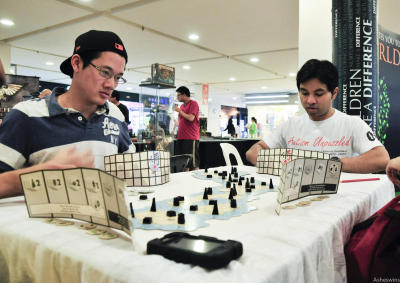By CHEE YIH YANG
I am sure I’m not the only person who wonders how long more will board games, trading card games (TCGs), living card games (LCGs) and their ilk be around.
With attention spans becoming shorter and shorter, and the greater acculturation of all things digital, will they still be popular in the foreseeable future?
An article by Forbes.com contributor Erik Kain titled “Are Boardgames Better Than Video Games caught my attention a few months back, where Kain responds to another article on Kotaku.com which suggested that board games were better.
In my opinion, there can’t be a definitive answer – though both articles mentioned that board game sales have actually been increasing, particularly since 2009 – but let’s give this debate a go anyway.
Broad gamers unite
Sales executive Kenny Chan, 29, fancies himself a “broad gamer”. From PC and mobile games to TCGs and the occasional board games, Chan indulges in all forms of gaming.
He feels that all in all, digital games often lack in interaction. Chan reckons that boardgames & TCGs are created to be more “social” – a given, since they always need more than one person to play the game.
“(Board games) always create conversations, as well as encourage healthy competition, interactions and cooperation between the players,” he said.
“Digital games, on the other hand, always strive to bring in the ‘social’ aspect of gaming by creating games that involves more than one player.”
For Chan, online games actually have a “lack of interaction” as everything is “masked” by a computer screen, with little cues to give away what the other players are feeling, how they’re reacting, or what they’re actually experiencing.
However, he reckons that board games require one to invest more time, though simpler board games can be more educational, especially games like Blokus, Ticket to Ride and Taboo.
Experienced players can then move on to more complex board games like Descent, Dungeons & Dragons, Risk and Smallworld.
“Board game cafes are great for those who want to play without owning the games, and these places also act as hangouts for young urbanites,” he added.
Teaching games
Edwin Wong, 50, owner of Imagine Games, thinks that as a whole, more people are playing board games – especially if we include those playing electronic versions.
“More and more people are discovering strategy board games and playing them as a form of social gathering,” he said.
He does concede that most people now prefer electronic games to “classic” board games such as Scrabble, Monopoly, Clue and Risk; but at the same time, many are discovering “Euro” board games such as Catan, Forbidden Island, and KHET.
Wong is a proponent of using board games and other forms of non-electronic games in schools, universities and the work place to develop skills like critical thinking, strategy and tactics, logic and deduction, and teamwork and collaboration.
He recently helped Cempaka Schools organize THINKCON for the third year running.

Cempaka Schools students exercising their thinking in a game of Ingenious, while having a whole lot of fun and socializing with others at the same time.
“We started this over three years ago with Cempaka Schools as the main supporter, and it has been successfully used in their three campuses (Damansara, Cheras and the International Ladies College).
“We also have it as an extracurricular activity in HELP college, REAL International School, Taylor’s College, Garden International and Mont Kiara International.
“We hope to start in more schools this year. It starts as extra-curricular, and then it is integrated into classes,” he explained.
Among the companies that have used games in the work place for recruitment and team building are Patimas Computers, UOB Bank, Standard Chartered, and Sepang International Circuit.
“Over the last three years, every parent we spoke to told us that they very much preferred their children playing strategy board games to electronic games, and cited the social and interactive aspects as the most important reasons for their preference.
“Simply put, almost all the parents have told us they preferred to see their child painting miniatures and playing strategy board games over chatting online and playing electronic games,” said Wong.

Many of the Cempaka students found themselves "addicted" to Samurai, a game of strategy and tactics where players vie to be the warlord of feudal Japan by influencing nobles, clergy and farmers.
So are board games and the like really on the up?
Interestingly, Wong notes that the larger board game manufacturers are reporting declining sales for classic titles, though that could also be down to the fact that these games are already in many households.
“But board-gaming is certainly not on a decline; as the mass market is only beginning to discover these wonderful titles and sales have been growing every year for the last five to six years,” he added.
Wong is hopeful that playing board/miniature/card games as a social activity will never be replaced by electronic gaming and socializing, as “there is simply a point where the benefits of convenience is overtaken by the perils of social isolation.
“Human beings are social creatures by nature so the fear of loneliness will fuel the never-ending need to interact with others in a non-electronic sense.”
There is a fear that miniature gaming is something that is slowly going the way of the dodo, something that Wong readily admits.
“True miniature gaming will always show signs of being endangered, simply because of the lack of time to paint up a force.
“However, the industry has responded to this in the form of pre-assembled/primed miniature figures that can be played right out-of-the-box,” he said.

Tell us what you think!